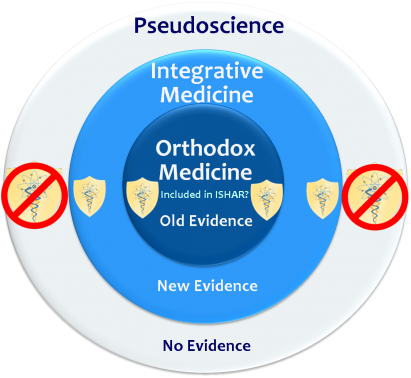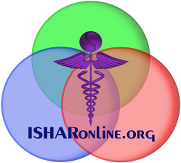ISHAR & Evidence
 The primary determining factor of whether something in included on ISHARonline.org is whether there is signficant evidence to present and discuss. As a scholarly database, ISHAR is evidence-based and places a very high premium on being as objective as possible. A common misconception is that Integrative Medicine is similar to Psuedoscience, and that both are outside the scope of science. In fact, Integrative Medicine is a field of medical science, and the only scholarly difference between Orthodox Medicine and Integrative Medicine is that the former is supported by old evidence that is no longer debated, and the latter is supported by new evidence that is still being debated. Pseudoscience, on the other hand, is made up of assertions with no supporting evidence.
The primary determining factor of whether something in included on ISHARonline.org is whether there is signficant evidence to present and discuss. As a scholarly database, ISHAR is evidence-based and places a very high premium on being as objective as possible. A common misconception is that Integrative Medicine is similar to Psuedoscience, and that both are outside the scope of science. In fact, Integrative Medicine is a field of medical science, and the only scholarly difference between Orthodox Medicine and Integrative Medicine is that the former is supported by old evidence that is no longer debated, and the latter is supported by new evidence that is still being debated. Pseudoscience, on the other hand, is made up of assertions with no supporting evidence.
When a topic is researched, for example Ayurveda, we attempt to gather every reputable, peer-reviewed study that is publicly available about that topic, whether old or new. ISHAR does not cherry pick or perform confirmation-biased searches, and our data crawling software is designed to automatically pick up any relevant studies. This is because discussions about Integrative Medicine are too important to allow them to be dismissed as biased or lacking sound evidence. ISHARonline.org is proof there are massive troves of evidence, and we include all of it; supporting, contradicting, and in between.
Most topic summaries on ISHAR include:
- An overview of the Integrative theory
- Summaries of research results (often compiled from the NIH)
- Links to the original studies
- Links to different reference databases (ie. Wikipedia, WebMD)
- Links to both supporting and skeptical websites relating to the topic
ISHAR's systems of scholarly rigor are designed to address our interdisciplinary scope, our summaries are divided into three fields of study, each with its own set of discipline-specific standards (marked in parentheticals). This is to determine which discipline’s sources are acceptable for a given topic (e.g. to ensure historical descriptions of a practice are not presented as medical evidence for that practice).
- Integrative Health (Medical sources): All subjects relating to integrative medical or psychological health. A few examples include acupuncture’s palliative effects, yoga’s health benefits, meditation’s psychological benefits and Ayurveda’s efficacy. This is the largest section in ISHAR.
- Integrative Culture (Historical & Anthropological sources): All subjects relating to cultural, historical and social aspects of belief systems, cosmologies, spirituality, cultural traits and practices.
- Integrative Theory (Scientific & Philosophical sources): All subjects relating to theoretical studies into integrative concepts that are scientific but not centered on medicine. Examples include consciousness research, quantum physics’ implications and philosophy.
All of these systems are in service to ISHAR's objectivity and reliability. While they occasionally result in cautious summaries, repetitive datasets, or "In Progress" labels, they also are what make ISHARonline.org the largest, most comprehensive, and reliable scholarly resource for Integrative Studies.
